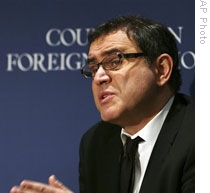VOA慢速英语 2008 1226a
时间:2018-12-01 作者:英语课 分类:VOA慢速英语2008年(十二)月
We look back at this year's bad economic news in the United States. Economic growth was expected to slow in two thousand eight. Housing prices had been falling in the United States since two thousand six. But few economists 2 predicted the financial collapse 3 only a few months away.

New York University economist 1 Nouriel Roubini speaking in New York earlier this year
Yet, Nouriel Roubini, a professor of economics at New York University, did just that. In two thousand six, he told economists at the International Monetary 4 Fund that the United States would likely face a housing crisis. He also predicted decreased consumer spending, high oil prices and a deep recession.
The year started with troubling economic news. Countrywide, the nation's largest mortgage lender, was in trouble. It was one of the biggest holders 5 of risky 6 subprime home loans. It had lost billions of dollars in bad loans the year before. Bank of America offered to buy Countrywide for four billion dollars in January. The deal was approved in June.
With the economy slowing, Congress passed a bill in February designed to ease the economic slowdown. The bill returned over one hundred fifty billion dollars to taxpayers 7, but did little to aid growth.
The first major sign of the financial crisis developing on Wall Street came in March with the collapse of Bear Stearns. It was once the fifth largest investment bank. But Bear Stearns was forced to sell itself to J.P. Morgan Chase bank in a government-negotiated deal. Bear Stearns had invested heavily in securities based on risky home loans.
During the summer, prices for goods such as precious metals and oil set records. Oil hit an all-time high of over one hundred forty-seven dollars a barrel on July eleventh. As a result, Americans started driving less. They rejected fuel-hungry vehicles that Detroit carmakers had been selling profitably for years.
In September, the government was forced to take control of America's two biggest housing finance companies, Fannie Mae and Freddie Mac. The companies hold trillions of dollars in mortgage-related securities. But concerns about their value meant that creditors 8 were unwilling 9 to lend to them. The rescue of Fannie and Freddie signaled the start of a severe credit crisis that would shake world financial markets.
And that's the VOA Special English Economics Report written by Mario Ritter. Listen again next week for more about this year's economic news. I'm Steve Ember.
- He cast a professional economist's eyes on the problem.他以经济学行家的眼光审视这个问题。
- He's an economist who thinks he knows all the answers.他是个经济学家,自以为什么都懂。
- The sudden rise in share prices has confounded economists. 股价的突然上涨使经济学家大惑不解。
- Foreign bankers and economists cautiously welcomed the minister's initiative. 外国银行家和经济学家对部长的倡议反应谨慎。 来自《简明英汉词典》
- The country's economy is on the verge of collapse.国家的经济已到了崩溃的边缘。
- The engineer made a complete diagnosis of the bridge's collapse.工程师对桥的倒塌做了一次彻底的调查分析。
- The monetary system of some countries used to be based on gold.过去有些国家的货币制度是金本位制的。
- Education in the wilderness is not a matter of monetary means.荒凉地区的教育不是钱财问题。
- Slaves were mercilessly ground down by slave holders. 奴隶受奴隶主的残酷压迫。
- It is recognition of compassion's part that leads the up-holders of capital punishment to accuse the abolitionists of sentimentality in being more sorry for the murderer than for his victim. 正是对怜悯的作用有了认识,才使得死刑的提倡者指控主张废除死刑的人感情用事,同情谋杀犯胜过同情受害者。
- It may be risky but we will chance it anyhow.这可能有危险,但我们无论如何要冒一冒险。
- He is well aware how risky this investment is.他心里对这项投资的风险十分清楚。
- Finance for education comes from taxpayers. 教育经费来自纳税人。
- She was declaiming against the waste of the taxpayers' money. 她慷慨陈词猛烈抨击对纳税人金钱的浪费。